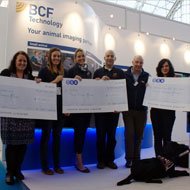
Charity challenge money will support Hearing Dog training, mobile clinics and neutering
Practices taking part in the Vet Charity Challenge have managed to raise more than £100,000 over the past three years, with cash from this year's event going towards cat neutering, training Hearing Dogs puppies and supporting a mobile clinic in Tunisia.
At this year's London Vet Show, the team handed over £36,000 to Cats Protection, Hearing Dogs for Deaf People and the Society for the Protection of Animals Abroad (SPANA).
A total of 47 teams from veterinary practices and industry took part in this year's event in Pewsey, Wiltshire. Teams of four spent a day walking, running, cycling, kayaking and orienteering, as well as completing a range of mental tasks.
Hearing Dogs will use their share of the money to train two new puppies. "We are thrilled to be supported by Vet Charity Challenge for a second year," said Deborah Bourne from the charity. "The amount raised is really inspiring."
The charity also brought along Dolly, a 12-month-old puppy in training, to collect the cheque. Money raised during last year's challenge is funding her training to become a Hearing Dog.
Cats Protection said the money would go towards cat neutering, while SPANA will use their share to support a mobile clinic in Tunisia.
Commenting on the event, Andrew Cooke from the winning team BVC Bashers, said: "All four of the team had a fantastic day, all a little bit sore, but well worth the effort. The event is great for team bonding and we enjoyed meeting other people from other practices. We look forward to coming back next year".
During the kayaking stage, Team Kruuse faced a further challenge when they rescued a dog from the Pewsey Canal. When they spotted an elderly dog struggling to climb the canal bank and repeatedly falling back into the water, team members managed to pull the animal onto their kayak and paddle downstream to a crew of vets and nurses. The dog recovered well after being taken to a nearby surgery.
A video of the challenge is available on YouTube and further details of next year's event will be made available on the Vet Charity Challenge website and Facebook page.
Image courtesy of BCF Technology



 The Animal and Plant Health Agency (APHA) has updated its online reporting service for dead wild birds.
The Animal and Plant Health Agency (APHA) has updated its online reporting service for dead wild birds.